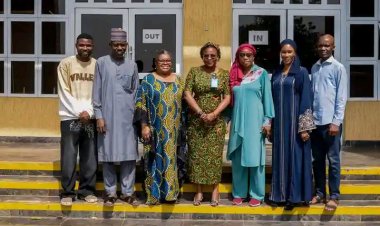Babcock University Professor Gives insight on How to Curb Maternal Mortality in Nigeria
Prof. John Sotunsa of Babcock University has called for a comprehensive, indigenous approach to curb maternal mortality in Nigeria.

Prof. John Sotunsa, a distinguished Obstetrics and Gynaecology expert at Babcock University, Ilishan-Remo, Ogun State, has emphasized the need for a comprehensive and indigenous approach to address Nigeria's maternal mortality crisis. Speaking at Babcock University's 49th inaugural lecture, titled "Beyond Superficial Success: Holistic Approaches to Maternal Mortality," Sotunsa underscored the urgency of tackling this pressing issue.
RECOMMENDED: Babcock University Student Emerges Overall Best in ICAN Exam
Sotunsa, who is also the Provost of the Benjamin Carson Snr College of Health & Medical Sciences at Babcock, highlighted the success of the Ondo State government's Abiye Initiative as a potential nationwide model. This initiative effectively addressed critical delays in maternal healthcare by integrating efforts between Primary and Tertiary Health Care Centres and employing trained health workers to provide timely and appropriate care. As a result, maternal mortality rates in Ondo State dropped dramatically from the national average of 545 per 100,000 live births to 100 per 100,000 live births within the first year of implementation.
The professor identified several key delays that exacerbate maternal mortality: delays in seeking appropriate care, reaching healthcare facilities, and receiving adequate care and referrals. He urged both governmental and private entities to focus on transforming Nigeria’s maternal health landscape by improving the accessibility, availability, affordability, and quality of primary healthcare centres.
"The statistics are clear. Delays in seeking help for pregnancy and childbirth, reaching specific facilities, and getting necessary care and referrals are major risk factors. Improving the accessibility, availability, affordability, and quality of primary healthcare centres is critical to improving health outcomes, particularly maternal mortality rates," he stated.
Prof. Sotunsa recommended a multi-faceted strategy that includes enhancing social support networks, implementing social insurance schemes, and improving mentorship, communication, and documentation within the healthcare system to curb these delays. He emphasized that adequate social support can significantly enhance pregnancy experiences and reduce premature deaths by 26 percent, while also lowering the incidence of depression, anxiety, stroke, heart disease, and dementia among women.
SEE MORE: Babcock University Matriculates 3,223 Students, Honors 2023 UTME Top Scorer
"We can keep our women alive if we look inward and maximize our opportunities. What we have, know, and do can prevent the majority of maternal deaths in Nigeria if we are available, consistent, ingenious, committed," he added.
In conclusion, Prof. Sotunsa stressed the importance of community-driven, locally adapted solutions in addressing the maternal mortality crisis. His call to action highlights the need for determined and resourceful efforts to ensure that maternal healthcare in Nigeria is both effective and accessible, ultimately saving countless lives.

 Chris Oyeoku Okafor
Chris Oyeoku Okafor 



